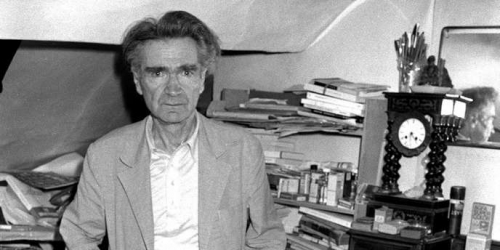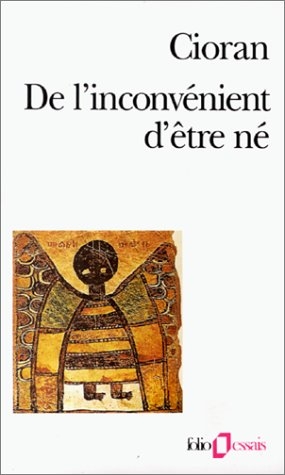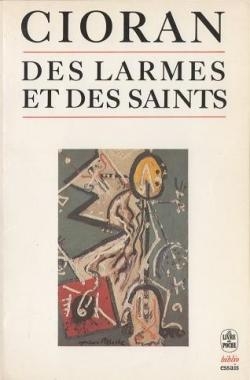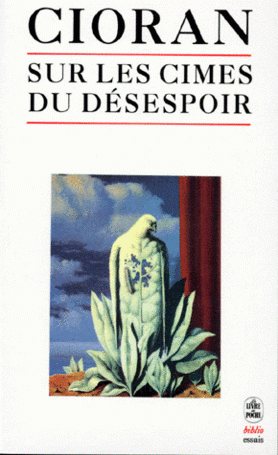dimanche, 27 janvier 2019
Cioran: The Postwar European Nihilism

Emil Cioran, De l’inconvénient d’être né (Paris: Gallimard, 1973).
 Growing up in France, I was never attracted to Emil Cioran’s nihilist and pessimistic aesthetic as a writer. Cioran was sometimes presented to us as unflinchingly realistic, as expressing something very deep and true, but too dark to be comfortable with. I recently had the opportunity to read his De l’inconvénient d’être né (On the Trouble with Being Born) and feel I can say something of the man.
Growing up in France, I was never attracted to Emil Cioran’s nihilist and pessimistic aesthetic as a writer. Cioran was sometimes presented to us as unflinchingly realistic, as expressing something very deep and true, but too dark to be comfortable with. I recently had the opportunity to read his De l’inconvénient d’être né (On the Trouble with Being Born) and feel I can say something of the man.
The absolutely crucial fact, the elephant in the room, the silently screaming subtext concerning Cioran is that he had been in his youth a far-Right nationalist, penning positive appraisals of Adolf Hitler and a moving ode to the murdered Romanian mystic-fascist leader Cornelius Zelea Codreanu. Cioran had hoped for the “transfiguration” of Romania into a great nation through zeal and sacrifice. Instead, you got utter defeat and Stalinist tyranny and retardation. I’d be depressed too.
A perpetual question for me is: Why did such great intellectuals (we could add Louis-Ferdinand Céline, Ezra Pound, Knut Hamsun, Mircea Eliade . . .) support the “far-Right”? This is often not so clear because the historical record tends to be muddied both by apologetics (“he didn’t really support them”) and anathemas (“aha! You see! He’s a bad man!”). Like John Toland, I don’t want to condemn or praise, I just want to understand: Why did he believe in this? Was it:
- Fear of communism?
- Skepticism towards democracy and preference for a stable, spirited regime? (That argument was very popular among thinking men in the 1920s, even the notorious Count Coudenhove-Kalergi, spiritual godfather of the European Union, supported Italian Fascism on these grounds!)
- Racialism?
- Anti-Semitism?
- Opposition to decadence?
- The dangerous propensity of many intellectuals for ecstatic spasms and mystical revolutions?
In Cioran’s case, his Right-wing sentiment appears to have been motivated by 1), 2), 4) 5), and perhaps especially 6).
After the war, Cioran renounced his Right-wing past. This may have been motivated by understandable revulsion at the horrors of the Eastern Front and the concentration camps. In any event, this was certainly not a disinterested move. Mircea Eliade – a fellow supporter of Codreanu who later thrived as a historian of religions at the University of Chicago, infiltrating the academy with Traditionalists – wrote of Cioran in his diary on September 22, 1942: “He refuses to contribute anything to German newspapers, in order not to compromise himself in the eyes of his French friends. Cioran, like all the others, foresees the fall of Germany and the victory of Communism. This is enough to detach him from everything.”[1]
There had been a thriving far-Right French literary and intellectual scene, with writers who often had had both a fascist and pan-European sensibility. The Libération in 1944 put an end to that: Robert Brasillach was executed by the Gaullist government during the Épuration (Purge) despite the protestations of many fellow writers (including André Malraux and Albert Camus), Pierre Drieu La Rochelle committed suicide, and Lucien Rebatet was jailed for seven years and blacklisted.
 As literally an apatride metic (he would lose his Romanian citizenship in 1946), Cioran, then, did not have much of a choice if he wished to exist a bit in postwar French intellectual life, which went from the fashionable Marxoid Jean-Paul Sartre on the left to the Jewish liberal-conservative Raymond Aron on the right. (I actually would speak highly of Aron’s work on modernity as measured, realistic, and empirical, quite refreshing as far as French writers go. Furthermore he was quite aware of Western decadence and made a convincing case for the culturally-homogeneous nation-state as “the political masterpiece.”) Although Cioran had written several bestsellers in his native Romania, he had to adapt to a French environment or face economic and literary oblivion. What’s an apology secured under coercion actually worth?
As literally an apatride metic (he would lose his Romanian citizenship in 1946), Cioran, then, did not have much of a choice if he wished to exist a bit in postwar French intellectual life, which went from the fashionable Marxoid Jean-Paul Sartre on the left to the Jewish liberal-conservative Raymond Aron on the right. (I actually would speak highly of Aron’s work on modernity as measured, realistic, and empirical, quite refreshing as far as French writers go. Furthermore he was quite aware of Western decadence and made a convincing case for the culturally-homogeneous nation-state as “the political masterpiece.”) Although Cioran had written several bestsellers in his native Romania, he had to adapt to a French environment or face economic and literary oblivion. What’s an apology secured under coercion actually worth?
This is the context in which we must read De l’inconvénient d’être né. These are the obsessive grumblings of a depressed insomniac. (Cioran’s more general mood swings between lyrical ecstasy and doom-and-gloom suggest bipolar disorder.) His aphorisms often ring true, but equally tend to be hyperbolic or exaggerated, and are almost always negative, like a demotivational Nietzsche. In some respects preferable to Nietzsche, insofar as the great explosion the German hysteric foresaw is past us, and his brand of barbaric politics seems quite impossible in this century. Cioran, like Nietzsche and Spengler, knows that nihilism and decadence are the order of the day, but living in the postwar era, he can certainly no longer hope that “blond beasts” or “Caesarism” might still save us. Cioran in this sense is more relatable, he is talking about our world.
Cioran despairs at the inevitable mediocrity of human beings and the vain temporality of the human condition. (What’s the point of even a good feeling or event, if this event will, in a second, disappear and only exist in my memory, which will in turn disappear? This will no doubt have occurred to thoughtful, angsty teenagers.) Birth, embodiment, is the first tragedy – like the fall of man – from a perfect non-existence, with limitless potentiality, to a flawed and stunted being.
Jean-François Revel observes: “Imagine Pascal’s mood if he had learned that he had lost his bet, and you’ll have Cioran.”
A question: Was Cioran’s despair more motivated by being a Rightist spurned by destiny or by his own dark temperament? Would he have written such works in a triumphant Axis Europe?
Cioran is like a Buddha (the spiritual figure most often cited in De l’inconvénient) who stopped halfway, that is to say, at nihilism and despair. But Siddhartha Gautama went further, from the terrifying recognition of our impermanent and insubstantial experiential reality, to a new mental state, reconciled with this reality, to the path of sovereignty and freedom.
Had I been able to meet him, I’d have invited Cioran to my Zendō – where speaking, indeed all expression of human stupidity, is formally banned through the most truthful silence. And how good is truth for the soul!
The Way of Awakening is not found in books.
Actually, Cioran’s Buddhist connection should be dug into. The Zen monk Taisen Deshimaru was in Paris passing on the Dharma to Europe at exactly the same time, in the 1970s.
 My initial response to De l’inconvénient was annoyance that it had been written (I can quite understand Alain Soral’s frustration with Cioran). The postwar Cioran can certainly seem like an umpteenth authorized manifestation of the ‘glamorously aesthetic’ French décadent intellectual, the misunderstood genius, the starving artist, who is just way ‘too deep’ for his own good or for you plebs to grasp.
My initial response to De l’inconvénient was annoyance that it had been written (I can quite understand Alain Soral’s frustration with Cioran). The postwar Cioran can certainly seem like an umpteenth authorized manifestation of the ‘glamorously aesthetic’ French décadent intellectual, the misunderstood genius, the starving artist, who is just way ‘too deep’ for his own good or for you plebs to grasp.
I remember his 1941 On France, a perversely playful ode to decadent France (those three words together disgust me), as an ostensibly appalling little work. France does not need any more encouragement on the downward path.
Cioran certainly has a morbid fascination with spiritual rot.
The Germans of the nineteenth and early twentieth centuries were already quite right to want to preserve themselves from the contagion of French decadence (oh sure, there’s a straight line of Kultur from the “Indo-Germans” to Frederick the Great’s Prussia); right up to the May-June 1940 editions of Signal understatedly mocking the infertile French with photographs of fez- and turban-wearing Negro and Mohammedan POWs. (Apologies for not providing a direct link to the relevant Signal issues, apparently our historians have still not got around to digitizing this publication, peak circulation 2.5 million in 1943.)
Sorry, krauts, it came anyway through the North-American route!
De l’inconvénient initially reinforced my impression that the postwar Cioran was not worth reading. However, there are some hopeful diamonds in the despairing rough. Some of Cioran’s aphorisms are actually quite inspiring, such as the following: “Any overcoming of desire empowers us. We have all the more control over this world as we take our distance from it, when we do not commit to it. Renunciation confers limitless power” (p. 44). (And let us bear in mind again Eliade’s paraphrase above, that it was the prospect of German defeat and communist triumph which was “enough to detach him from everything.”)[2]
On one level, Cioran’s work is a legitimate expression of the depths of postwar despair. From the psychological point of view, man really was (and is still, despite a few flickers) sinking more and more into untruth, into materialism and consumerism and ‘choice,’ into a childish view of life, one not cognizant of our nature as mortal, social, and unequal beings. All the truths contained in our dying traditions, however imperfect the latter were, are forgotten.
Amidst the politically-harmless mass of depressing and demotivational thoughts, Cioran sneaks in some very true observations about decadence. This shows, as plainly as anything, that he remained a man of the Right in his heart.
I believe Cioran provides a key to understanding his nihilist work in this book, namely:
We get a grip on ourselves, and we commit all the more to being, by reacting against nay-saying, corrosive books [livres négateurs, dissolvants], against their noxious power. These are, in short, books that fortify, because they summon the energy which contradicts them. The more poison they contain, the greater their salutary effect, as long as we read them against the grain, as we should read any book, starting with the catechism. (p. 97)
Cioran is putting forth a challenge to be overcome: taste the depths of my despair, truly contemplate and acknowledge the futility of life . . . What is your answer?
Cioran’s books: contemplation of the void . . . a summoning.
I find Cioran both uncomfortable and stimulating, clamoring for more, eager to discover and accomplish more. Fecund stimulation is most important, whether in reading, work, or life. (For that reason I also recommend reading Ezra Pound’s non-fiction.)
Cioran’s nihilist and depressing aesthetic will not appeal to everyone or even to most. But if that’s how a man builds up his brand and sells his books, who am I to judge? Especially if you can sneak in some subversive truths. (In this respect, Cioran reminds me of Michel Houellebecq, one of the last manifestations of French culture. All this goes back to Socrates-as-satyr.)
Still, we observe that many men of the Right took a more straightforward route: Maurice Bardèche avenged his brother-in-law Brasillach’s execution by continuing to write in favor of fascism, Julius Evola always stood up for the Axis and for Tradition, Dominique Venner wrote as a historian, Europe’s living memory, and committed his own seppuku, as a sacrifice to the gods . . .
Each man fights in his own way. Again, who am I to judge?
Notes
[1] Mircea Eliade, The Portugal Journal (Albany, New York: State University of New York Press, 2010), 35.
[2] Note: detachment does not mean surrender. For those who do not understand, I recommend the Baghavad Gita, the Hagakure, D. T. Suzuki’s explication of “the Way of the Sword” in Zen and Japanese Culture, or indeed watching the countenance of the faces of men about to strike their opponent in Akira Kurosawa’s classic film Seven Samurai.
12:45 Publié dans Livre, Livre, Philosophie | Lien permanent | Commentaires (0) | Tags : philosophie, cioran, livre, roumanie, france, nihilisme |  |
|  del.icio.us |
del.icio.us |  |
|  Digg |
Digg | ![]() Facebook
Facebook



Les commentaires sont fermés.